
 |
|
|
|
If you happened to be at Francis Coppola's Zoetrope studio in 1979 or 1980, you could have seen Wim Wenders filming a detective thriller or watched Gene Kelly eagerly assisting with dance numbers for One From the Heart. But you also might have bumped into one of Coppola's salaried "Filmmakers in Residence" walking in the Hollywood sunlight. A friend of mine stepped into a Zoetrope elevator and met a slight, aged balding Englishman with a snap to his step and a twinkle in his eye -- the legendary director Michael Powell. This friend excitedly reported that Powell was happily humming Sabu's signature ditty from the 1940 The Thief of Bagdad: "I want to be a bandit, can't you understand it?" Coppola and Martin Scorsese helped launch a major rediscovery of one of filmdom's most creative and unappreciated talents. Michael Powell got his start in the 1920s, learned the directing game churning out cheap "Quota Quickies" for the English market and attracted attention with a stunning drama about the last inhabitants of an island due to be evacuated, The Edge of the World. Soon afterward came assignments from the prestigious producer Alexander Korda and an inspired partnership with Emeric Pressburger, a Hungarian writer with a talent for intricate, witty scripts. For the next eighteen years the two men worked as a team called The Archers. They signed most of their films with the unique credit, "Written, Produced and Directed by Michael Powell and Emeric Pressburger." 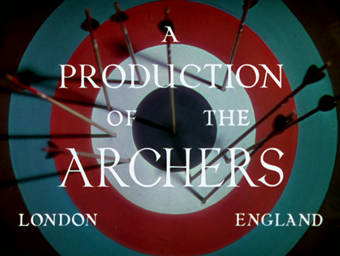
Films by The Archers begin with an arresting logo graphic, an arrow hitting a bull's eye. No two Archers films are alike, but all contain an unmatched enthusiasm for the potential of cinema. They're technically advanced, visually adroit and refreshingly accessible. The color features show off the artistry and skill of the famed cameraman Jack Cardiff, who uses Technicolor as if the hues came off a painter's palette. It's taken a number of years, but now all of the major films by The Archers are on DVD, along with a couple of Powell's better solo efforts. This article is a blanket recommendation for their work, even a couple of discs that contain less-than-perfect transfers. 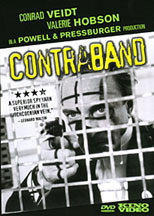
In a way, Powell and Pressburger got their big start in the vacuum left when Alfred Hitchcock departed for America, just before the outbreak of WW2. Their first collaborations were Hitchcock-like espionage thrillers starring the German actor Conrad Veidt. The Archers resisted jingoistic stereotypes, allowing Veidt's U-Boat commander in The Spy in Black to be a sympathetic character. Narrative gimmicks and clever set pieces make these thrillers both suspenseful and funny. Contraband is available in a good but not great transfer from Kino; The Spy in Black is at present not listed as a Region 1 disc. 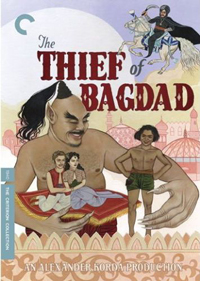
Powell was one of several directors on Korda's magnificent The Thief of Bagdad, a massive Technicolor spectacle that had to be finished in California when the war broke out. The best version of this Arabian Nights classic is a deluxe 2-disc Criterion release from 2008. 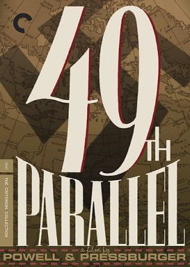
The Archers' official wartime features are all available from Criterion as well. Each is technically a war propaganda film, but only the first has conventional combat scenes. The 49th Parallel aka The Invaders carries a bald anti-Nazi message. The survivors from a German submarine sunk in Hudson Bay in northern Canada work their way southward toward the neutral United States, murdering as they go. A German-Canadian Hutterite commune rejects them, and they're eventually defeated by Canadian common sense and their own arrogance. The movie was considered an ideal morale-builder, but Powell & Pressburger never made another like it. 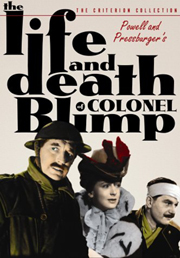
1943's The Life and Death of Colonel Blimp is an ambitious Technicolor "biography" of an English cartoon character that satirized the inefficiency of an Army staffed with old codgers from as far back as the Boer War. Besides recommending that a modern war needed to be fought with new ideas, Blimp presents a sympathetic German officer (Anton Walbrook) who is more competent than the British hero. Prime Minister Winston Churchill considered suppressing the film, which was criticized by many as bad for the war effort! Blimp was a major career step for actress Deborah Kerr, who played three separate roles. 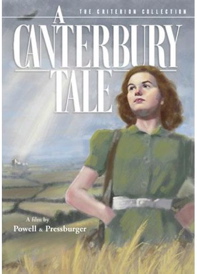
Powell and Pressburger then assembled an even more opinionated picture, A Canterbury Tale. This time they concentrated on the story of three wartime "pilgrims" who don't realize that their stay in the Kent countryside will grant each of them a personal miracle. Made without stars and in B&W, the film strives to define and distinguish the concept of "Britishness", which at times seems synonymous with "eccentric". One authority figure throws glue in the hair of girls that step out with American soldiers! The low-key movie is probably not the best introduction to Powell's work, but it ends on an extremely moving note. 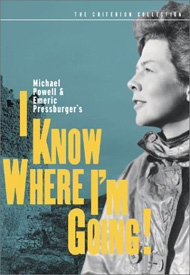
I Know Where I'm Going! expresses Powell's love of travel to remote destinations and his affection for Scotland. The vibrant Wendy Hiller plays a headstrong woman en route to a private island, to marry a pompous industrialist sitting out the war. She's delayed by weather and the near-magical influence of local superstitions, while a local naval officer on leave (Roger Livesey, who played Colonel Blimp) becomes far too attractive for comfort. Like many of Powell's films, I Know Where I'm Going! vanished so thoroughly that its reappearance in the 1980s was like the unearthing of a lost masterpiece. It remains the romantic favorite of many Archers aficionados. 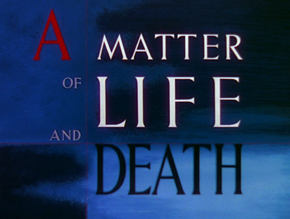
The Archers' first postwar film is A Matter of Life and Death, a whimsical fantasy that places a British bomber pilot (David Niven) in an existential limbo between two worlds. Unaccountably surviving a parachute-less fall from an airplane, the pilot hallucinates a B&W heaven populated by historic figures from the past that want to claim his soul. A brain operation is interrupted by a heavenly trial for the pilot's life, with emissaries from the beyond descending to earth on a celestial "Stairway to Heaven" (the film's American title). Jack Cardiff's Technicolor photography is a string of amazing expressionist visions, capped by a heart-tugging negotiation for the pilot's life by his American sweetheart (Kim Hunter). A Matter of Life and Death has just been released by Sony, as half of a disc set called The Films of Michael Powell. 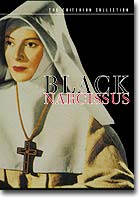
The next four pictures, all available from Criterion, show The Archers reaching their greatest commercial success. Black Narcissus is an exotic, almost perversely hypnotic movie about British nuns trying to establish a convent on a mountain peak in the Himalayas, an effort undermined by the sensual Indian culture and their own personalities. Deborah Kerr stars, with Kathleen Byron a standout as a sister who goes insane in the thin mountain air. Made entirely in a studio with elaborate mattes and miniatures, the film won Oscars for Jack Cardiff and art director Alfred Junge. 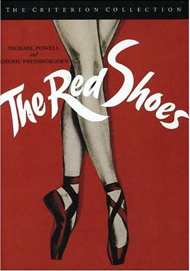
It is said that The Red Shoes sent a generation of young women and girls off to ballet school. The Archers' most profitable film sees ballerina Moira Shearer go from novice to star, only to succumb to the pressures of her art. The highlight is a highly expressionist extended ballet that reportedly inspired Gene Kelly to lobby for giant dance numbers for his MGM musicals. A truly intense experience, the film plays extremely well on DVD. 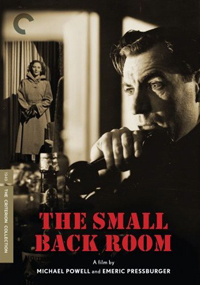
Criterion's latest addition to its Powell and Pressburger collection is The Small Back Room, a modest drama that returns to a wartime theme. David Farrar and Kathleen Byron star in the story of a military researcher beset with bureaucratic problems and a painful handicap. He begins to slide into alcoholism just as his expertise is needed to defuse a diabolical new booby-trap bomb being dropped by the Germans. The almost perfect drama contains an expressionistic hallucination scene and a suspenseful climax in which the scientist must deal with a bomb found on a lonely beach. 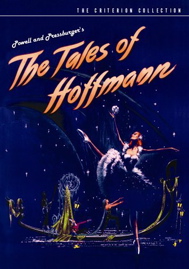
The Tales of Hoffman was an expensive disaster that Alexander Korda did not want to make. A treat for ballet fans and the Powell/Pressburger faithful, it's been touted as an artistic triumph and condemned as "high kitsch", an unfair charge sometimes leveled at The Archers' flamboyant style in general. The rest of the Powell and Pressburger films are not yet available on Region 1 DVD. Gone to Earth is a period romance about the fortunes of a poor country girl played by Jennifer Jones. The Battle of the River Plate is an exciting account of the end of the German pocket battleship Graf Spee, filmed in Technicolor and VistaVision. Their last collaboration is Ill Met by Moonlight, another true-life war exploit in which British spies kidnap a German general from the island of Crete. 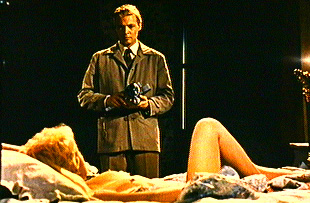
Michael Powell's final two solo films available on R1 DVD are wildly divergent in tone and theme. 1960's Peeping Tom was vilified so vociferously that it was pulled from release almost immediately. Released in the same year as Psycho, the horror shocker bore the brunt of critical resentment building against gory Hammer product. Peeping Tomconcerns a mad assistant cameraman who plays out his twisted sexual obsessions by filming the agonized faces of his victims as they die; offended critics overlooked Powell's intricate play with the theme of voyeurism. The misunderstood masterpiece stopped Powell's directorial career cold. 
Nine years later Powell traveled to Australia's Great Barrier Reef to make Age of Consent, a sunny idyll that takes advantage of the new rating system to examine the relationship between life, art and sensuality. Co-producer James Mason stars as a famous painter who recharges his creative spirit during a season on a beach. There he meets his nymph-like muse, played with uninhibited delight by Helen Mirren (in her first film). As a reflection on the frustrations and rewards of creativity, Powell directs his last theatrical feature with his customary precision, yet it has a wonderful relaxed quality ... it's the work of a man with no anxieties. Age of Consent has just debuted as the second half of the Sony Michael Powell disc, with A Matter of Life and Death. The fiercely creative, independent films of Michael Powell owe little to other filmmakers' work; they're like an island of intelligent, original expression in a movie history dominated by copycats, fads and numbing commercial compromises. Powell made his share of failures, particularly after 1950, but even some of the flops now seem much more worthy than average. If film fans have a special attraction for Powell's work, it's because his love of movies as artcraft shines through everything he's directed. The Criterion releases come with commentaries and abundant extras. As almost all of the films have a history of editorial re-cuts and inferior alternate versions, it's a pleasure to watch them as they were originally finished. The biographical sections reveal Michael Powell as a unique personality who loved his films as well as his actresses. After seeing a few of Powell's pictures you may want to track down his two-volume autobiography, entitled A Life in Movies. It's one of the best film books this reviewer has read. January 12, 2009
Reviews on the Savant main site have additional credits information and are often updated and annotated with reader input and graphics. Also, don't forget the 2009 Savant Wish List. T'was Ever Thus.
Review Staff | About DVD Talk | Newsletter Subscribe | Join DVD Talk Forum |
| ||||||||||||||||||